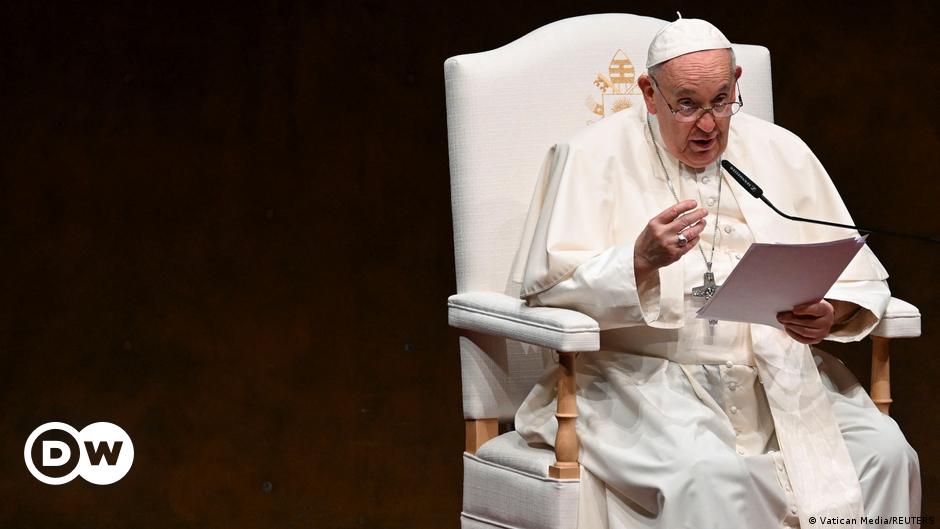Pope Francis has lamented a “very strong reactionary attitude” in the US Catholic Church, saying that ideology had replaced faith in some parts of it and some members had failed to understand “there is an appropriate evolution in understanding matters of faith and morals.”
During his decade as pontiff, Francis has often faced criticism from conservative sectors of the US church, opposed to reforms such as giving women and lay Catholics more roles and making the church more welcoming and less judgmental towards some, including LGBT people.
The comments were made in Portugal on August 5, during a private meeting on Francis’ trip to Lisbon with members of the Jesuit order the pope belongs to, but were scheduled to be published in full as part of the Italian Jesuit journal Civilta Cattolica’s end-of-August edition. Daily paper La Repubblica published excerpts in advance on Monday
During the question-and-answer session, a Portuguese Jesuit said that he was saddened while on a sabbatical in the US to find many Catholics, including some bishops, who were hostile to Francis’ leadership.
“You have seen that in the United States the situation is not easy: there is a very strong reactionary attitude,” Francis said. “It is organized and shapes the way people belong, even emotionally.”
The liberal Argentine pontiff, born Jorge Mario Bergoglio, has also faced criticism from religious leaders and conservative media in the US on a host of his other stances, including climate change, immigration, social justice, gun control and opposing the death penalty as “neither human nor Christian.”
“You have been to the United States and you say you have felt a climate of closure. Yes, this climate can be experienced in some situations,” Francis told the questioner. “And there, one can lose the true tradition and turn to ideologies for support. In other words, ideology replaces faith, membership in a sector of the church replaces membership in the church.”
Francis said his critics needed to understand that “there is an appropriate evolution in the understanding of matters of faith and morals,” and that being backward-looking was “useless” for the church.
He said it was an “error” to consider church teachings to be a “monolith.”
Francis gave both a historical and a more recent example to try to illustrate this, saying there was a time when many in the Catholic Church would have supported slavery. In the more recent case of homosexuality, he said, “it is apparent that perception of this issue has changed in the course of history.”
“But what I really dislike more generally is when you look at the so-called sins of the flesh through a magnifying glass, as people did for so long,” Francis said. He argued that pastoral care required “sensitivity and creativity,” also mentioning his first meeting with trans people. “It’s become clear to me that they feel spurned. And that’s really hard,” he said.
One of the pope’s fiercest American critics is Rome-based Cardinal Raymond Burke. He wrote in an introduction for a recent book that a meeting of bishops called by Francis for this October to try to help chart the future of the church risked sowing “confusion and error and division.”



In theory the Pope has such powers, but technically he is the first among equals. It would only make things worse if he started acting like a dictator purging bishops that don’t agree with him. There is already a strong, “not my Pope” movement in the US, hence this article. He doesn’t want to drive those people further away. His goal is unity not division.
But then if a conservative pope acted like that nobody would be surprised.
It feels to me like the modern Catholic Church ought to be uniquely schism-proof because without Rome you’re basically just another random conservative Protestant church and there are other, equally conservative Protestant churches that are bigger + better at marketing.
Last thing you want is more schismatics claiming apostolic succession. Priests leaving is not a big deal, but bishops are.
There are plenty of those already - many of the major Protestant denominations have at least some sort of argument why they have it; heck, the Mormons claim apostolic succession despite the lack of anything resembling an episcopal lineage because they say the apostles conferred it on Joseph Smith directly in a vision.
(and if you’re going to make arguments based strictly on historical facts, then the fact that most of the current Catholic hierarchy - including every pope in the last 300 years - traces their ordination back to one 16th-century Italian dude with no idea who ordained him tends to poke a hole in those)
Yeah, well, I got consecrated by Peter himself!
lol
Trump is their pope.